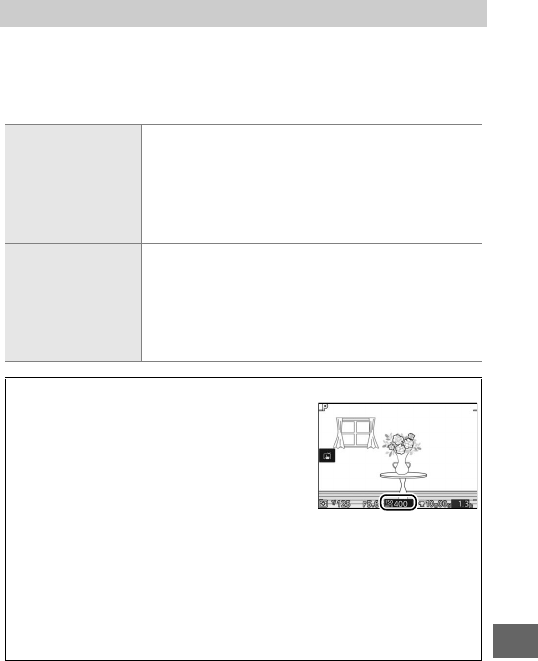
201
)
The camera’s sensitivity to light can be adjusted according to the
amount of light available. The higher the ISO sensitivity, the less
light needed to make an exposure, allowing faster shutter
speeds or smaller apertures.
ISO Sensitivity
q
x
w
Auto (160–6400)
Auto (160–3200)
Auto (160–800)
The camera adjusts ISO sensitivity in response to
lighting conditions. ISO sensitivity is adjusted in
the range given in brackets; choose larger ranges
for increased sensitivity when lighting is poor,
smaller ranges to reduce noise (randomly-spaced
bright pixels, fog, or lines).
160, 200, 400, 800,
1600, 3200, 6400,
6400 (NR), 12800,
12800 (NR)
ISO sensitivity is fixed at the selected value. If 6400
(NR) or 12800 (NR) is selected, the camera will take
four shots each time the shutter-release button is
pressed all the way down and combine them to
create a single image processed to reduce the
noise that occurs at high sensitivities.
A
“Auto” ISO Sensitivity Options
When auto ISO sensitivity control is in effect,
the display shows an ISO AUTO icon and the
current ISO sensitivity.
D
6400 (NR)/12800 (NR)
The edges of the image will be cropped out and built-in and optional
flash units and Active D-Lighting can not be used. The desired results
may not be achieved if the camera or subject moves during shooting. If
NEF (RAW) or NEF (RAW) + JPEG fine is selected for image quality, the
picture will be recorded as a fine-quality JPEG image. Only one shot will
be taken if the shutter speed is slower than
1
/
30 s.


















